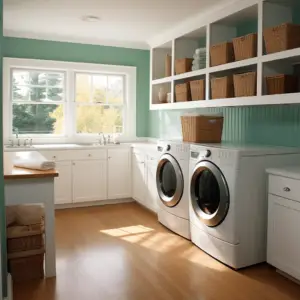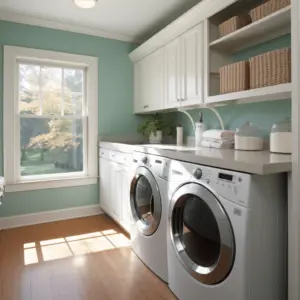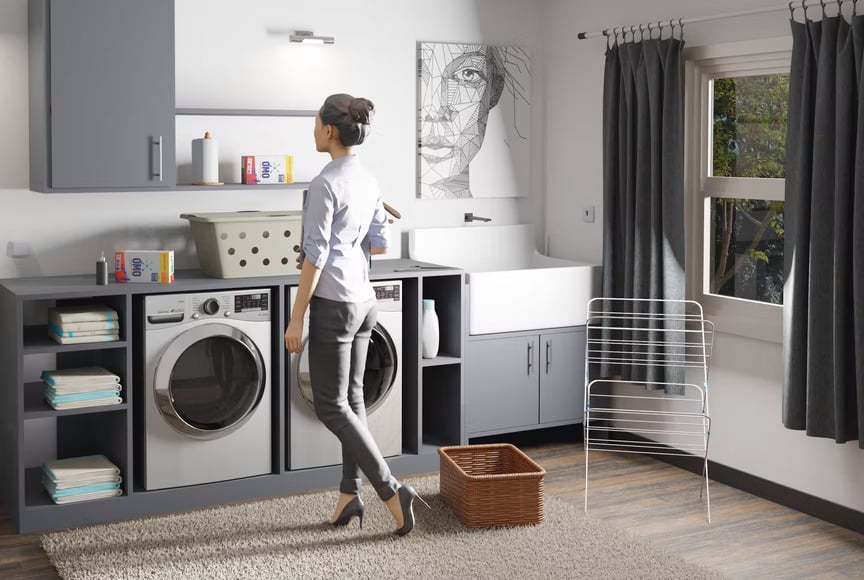Table of Contents
Second floor laundry room requirements: A laundry room is one of the crucial areas in any home that assist in making a proper house. Despite being the smallest, without it, the building is incomplete.
For many years now, there has been a discussion about the laundry room’s location. People have different opinions, with some preferring the basement/garage, some on the main floor, and others on the second floor.
However, many people prefer their laundry on the second level of the building. If you are among those who consider a second-floor laundry, there are requirements you need to consider which are essential for a successful laundry experience.
Different areas consist of various laundry requirements, so ensure you get yourself informed of what you require by contacting your local authority or even a licensed plumber expert for more information.
In this article, we will help you get your second level laundry started from the reason you should go for it, the Cons and all the requirements you need. Let’s dive into the details.

Second Floor Laundry Room
It is a room on the second floor of a building where you can do your laundry. Like any other laundry room in any place, be it a basement or anywhere else, it still houses every appliance needed in laundry, from a washer and dryer to hoses and hampers.
But what are some of the benefits and downsides of having your Second floor laundry room requirements on the second floor? Read more in our next section.
The Pros and Cons of a Second Floor Laundry
Pros
- There is no need for baskets in the bedroom, for the laundry room is within reach, and it is easy to take the clothes directly to the laundry room.
- Having your laundry away from the guests’ eyes is an excellent idea, for they don’t have to stumble over undone laundry.
- It is near for emergency loads if an accident occurs, mainly at night.
- It is an ideal location for those with back pain issues, herniated disks, and arthritis, for they don’t have to carry heavy loads on the stairs.
- It eliminates your trips up and down the stairs with loaded laundry baskets filled with clothes; thus, having its second floor sounds excellent.
- Contribute to freeing up some space in your closet as you can move your bedroom closet to the second floor.
- It is time-saving to collect clothes from the rest of the rooms, get kids ready for bed, etc. The soiled garments are thrown into the wash hamper handy for washing.
- It can be the best option for your teenagers to do their laundry for busy parents with teenagers as you keep your master room out of bounds.
- It becomes flexible to do your laundry at any time and day.
Cons
- There is a greater risk of leak damage because the floor underneath the washer acts as a ceiling to the first floor. A leak on the second floor can damage the ceiling, walls, and bottom floors below. The machine might overflow, or the washer hose may burst, posing more damage to the house.
- The temperature at your second level becomes warmer due to the heat cycle on your dryer. Therefore, it is advisable to keep the laundry door shut to regulate the temperatures.
- It will add noise to your second level; hence if you love taking naps during the day or watching movies, you will have to consider this factor.
Second Floor Laundry Room Requirements
For a smooth laundry experience, it is vital to meet all the requirements of a second-floor laundry. Read on 9 must-haves.
A permit from Your Locals
Depending on your state, you must acquire either a building or installation permit before installing a washer and dryer on the second level. Ensure you make enquiries from your municipal to establish what exact requirements you need to meet
Laundry Room Location
You need to consider the position of the room before the appliances get installed, whether it should be near your bedroom or the children’s. It is best near your main bedroom to avoid the kids waking up often due to the noise. Above all, the laundry should not be near the bedroom due to their noise.
Ventilation
The law requires sufficient ventilation in and out of your laundry room because laundry generates too much heat and moisture. Lack of adequate ventilation may lead to critical issues; thus, it is made a requirement by law, regardless of your location, to have enough ventilation.
A Braided Stainless Steel Hoses
Rigid metal is preferred to lessen the build-up of lint. Allowing enough airflow into your laundry room will help cool down the machine after use and prevent fire in the laundry space.
Your House’s Entrance and Staircase
It is paramount to ensure that your door and stairs are spacious enough for the ease of passage of the appliances. The stairs should have a width of 45-inches to enable a 90-degree turn of the machine when moving it.

Door
Before purchasing the appliances, consider your laundry door to save yourself the frustration of them not entering the room.
Laundry Space
The law requires your laundry appliances to have enough space regardless of the laundry location. More so, a washer and dryer.
Floor Drain
It is an essential feature in the laundry room. Ensure there is a floor drain with a primer line because the work of a primer line is to direct water into the C-trap of the drain, which makes a seal keep the sewer gasses from backing up into your house.
Flood prevention
Second floor laundry room requirements: Second-floor laundry is near the bedrooms, and just in case there is an overflow from the machine, flooding will occur. It will damage the things in the bedroom and the first floor’s ceiling, walls, and even the floor.
Therefore, it is mandatory to get flood prevention appliances such as electronic valve shut-off and a leak detector and adhere to the procedures to avoid finding yourself in a messy situation that may cost you expensively.
Ensure you meet all the second-floor requirements because they are for your benefit. The requirements keep you secure and your entire house as you utilize the appliances in the laundry room. Follow the prevention measures given in the article, and you will be safe.


